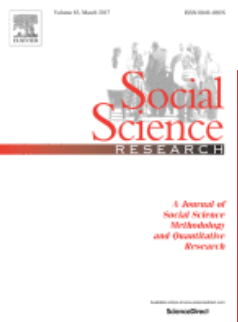Reconsidering residential mobility: Differential effects on child wellbeing by race and ethnicity
Residential mobility is a common experience among Americans, especially children. Most previous research finds residential mobility has negative effects on children's educational attainment, delinquency, substance abuse, and physical and mental health. Previous research, however, does not fully explore whether the effect of mobility differs by child race/ethnicity, in part because many of the samples used for these studies were majority white or exclusively non-white or disadvantaged. In addition, previous research rarely fully accounts for factors that predict selection into mobility and that may also be related to the outcome of interest. This study simultaneously addresses both of these limitations by estimating the effect of moving homes on children's emotional and behavioral wellbeing using first difference models and a diverse longitudinal sample from the Project on Human Development in Chicago Neighborhoods. I find that, after controlling for a wide range of individual, caregiver, household and neighborhood characteristics, the effects of moving among African American and Latino children are significantly worse than among white children.

